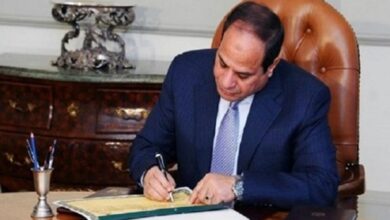Wednesday’s papers all lead with different stories as events continue to unfold in Egypt at a dizzying rate.
The privately owned Al-Shorouk leads with the official investigations into the Israeli Embassy break-in on 9 September and the later clashes in front of the Giza Security Directorate. In a possible hint as to why the Emergency Law is back in play, and echoing Prime Minister Essam Sharaf’s comments that it is a temporary measure to protect the revolution from “thugs,” State Security Prosecution investigations allege former National Democratic Party members were involved in the violence.
Businessmen affiliated with the now-defunct party hired men to break into the embassy and attack the security directorate and the Interior Ministry to prove that security was better under Hosni Mubarak, Al-Shorouk reports, citing the investigation. A so-called “feloul” cell hired thugs to create the chaos, according to investigations.
State-owned Al-Akhbar quotes Tarek al-Bishry, the man behind the constitutional amendments put to a referendum in March, who said that, according to Article 59, the Emergency Law cannot be activated because Egypt’s state of emergency has expired. The article says that the country cannot have a state of emergency in place for more than six months without a popular referendum. Bishry notes that the Supreme Council of the Armed Forces has no authority to extend the law without such a referendum.
State-run Al-Ahram leads with the story about political opposition to renewed enforcement of the Emergency Law. Well, not really – you have to read a bit closer to find that the objection is actually against holding a popular referendum on the law and on another governing parliamentary elections.
The objection comes from the Democratic Alliance, a bloc of Islamist and Nasserist parties, which also includes the liberal Al-Wafd. The alliance is against the referendum because it wants elections as soon as possible and wants the Emergency Law scrapped immediately. The Muslim Brotherhood’s Freedom and Justice Party leads this opposition, likely due to their perceived advantage in upcoming elections.
Sharaf’s insistence his government is not biased toward the Muslim Brotherhood made it onto the front pages of both Al-Shorouk and independent paper Al-Tahrir. Sharaf said Tuesday his government is not partial to Islamist groups and handles its affairs in a politically neutral manner.
The government’s aim, Sharaf continued, is to achieve the aims of the revolution. But in almost the same breath, Sharaf swiped at one main aim, social justice, by saying the economy does not allow the government to raise the salaries of teachers currently on strike, according to Al-Tahrir.
“The teachers are not alone,” Sharaf reportedly said. “All sectors are making demands and the Egyptian economy in its current state is not doing well and does not allow for hundreds of millions to settle all demands at once.”
Liberal party paper Al-Wafd reports the strikes led to violence in Fayoum and gunfire in Suez, where angry parents attempted to break the demonstration up by force. It also reported that Higher Council for Islamic Affairs member Youssef al-Badry filed a lawsuit to force the government to end the strikes on religious grounds. However, the religious angle seems a bit tenuous as many of the teachers at Al-Azhar, Sunni Islam’s highest educational body, are also on strike.
Egypt's papers:
Al-Ahram: Daily, state-run, largest distribution in Egypt
Al-Akhbar: Daily, state-run, second to Al-Ahram in institutional size
Al-Gomhurriya: Daily, state-run
Rose al-Youssef: Daily, state-run
Al-Dostour: Daily, privately owned
Al-Shorouk: Daily, privately owned
Al-Wafd: Daily, published by the liberal Wafd Party
Youm7: Daily, privately owned
Al-Tahrir: Daily, privately owned
Sawt al-Umma: Weekly, privately owned
Al-Arabi: Weekly, published by the Arab Nasserist party




